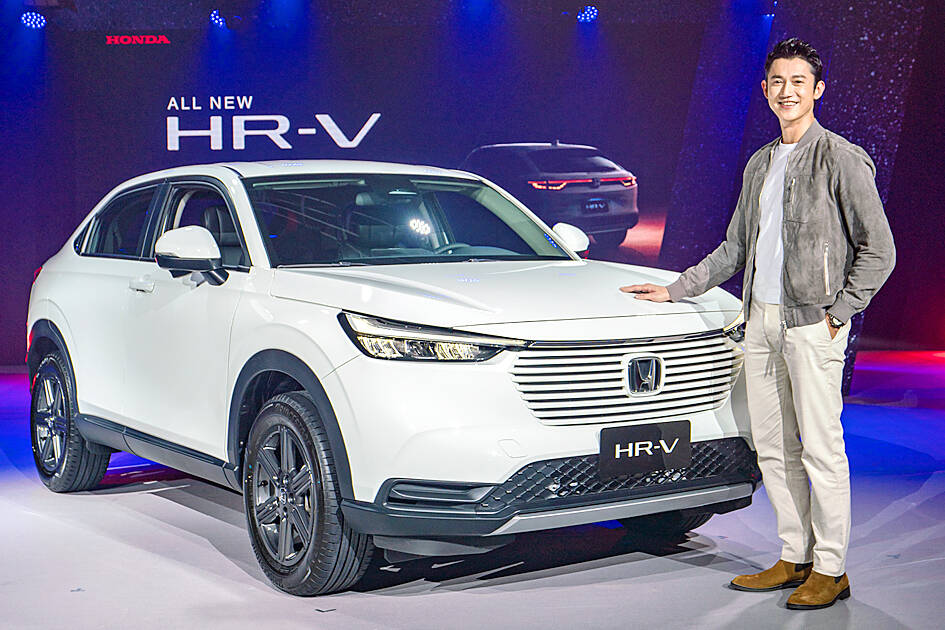Honda Taiwan Co (台灣本田) yesterday unveiled extensive price hikes for its vehicles, including a 2 percent increase for the popular CR-V series, as it joined its peers in raising prices to cope with rising raw material and manufacturing costs.
The entry model CR-V Ti sports utility vehicle costs NT$999,000 (US$33,636) following the price increase, Honda Taiwan’s Web site showed.
The vehicle previously sold for NT$970,000 following a NT$10,000 price hike in April last year.

Photo courtesy of Taiwan Honda Co
The price of the hybrid Honda Fit rose by NT$10,000 to NT$829,000 per unit, while the gasoline-
powered Fit compact hatchback costs NT$759,000, the Web site showed.
The new prices took effect on Wednesday. Honda first announced the price hikes in December.
Ford Lio Ho Motor Co (福特六和), a subsidiary of US-based Ford Motor Co, on Wednesday increased the prices of its Focus series by NT$30,000 per unit, and NT$20,000 to NT$30,000 for its Kuga family.
Yulon Nissan Motor Co (裕隆日產), Hotai Motor Co (和泰汽車), which distributes Lexus and Toyota models in Taiwan, and China Motor Corp (中華汽車), which markets vehicles under the Mitsubishi brand, last month raised their prices by between NT$10,000 and NT$110,000 per unit.
In related news, new vehicle sales last month plummeted 14.4 percent annually to 34,788 units, falling short of Hotai’s expectations of 38,000 units, as the Lunar New Year holiday cut the number of working days, market researcher U-car.com said.
Last month’s figure represented a monthly drop of 16.9 percent.
Hotai expects new vehicle sales in Taiwan to expand 11 percent this month to 27,000 units from the same month last year, thanks to replacement demand and an improving auto chip supply.
The company last month sold 13,505 Toyota and Lexus vehicles, down 5 percent from a year earlier. It sold 201 Toyota bZ4X electric vehicles last month, making the model the best-selling electric vehicle.
Hotai held a 38.8 percent market share, retaining its top position, while Mercedes-Benz Taiwan Ltd (台灣賓士) ranked second with sales of 2,509 units, down 23.5 percent annually.
Yulon Nissan, which distributes Nissan and Infiniti vehicles in Taiwan, took the third spot with sales of 1,965 units, contracting 34.7 percent annually.

SEEKING CLARITY: Washington should not adopt measures that create uncertainties for ‘existing semiconductor investments,’ TSMC said referring to its US$165 billion in the US Taiwan Semiconductor Manufacturing Co (TSMC, 台積電) told the US that any future tariffs on Taiwanese semiconductors could reduce demand for chips and derail its pledge to increase its investment in Arizona. “New import restrictions could jeopardize current US leadership in the competitive technology industry and create uncertainties for many committed semiconductor capital projects in the US, including TSMC Arizona’s significant investment plan in Phoenix,” the chipmaker wrote in a letter to the US Department of Commerce. TSMC issued the warning in response to a solicitation for comments by the department on a possible tariff on semiconductor imports by US President Donald Trump’s

‘FAILED EXPORT CONTROLS’: Jensen Huang said that Washington should maximize the speed of AI diffusion, because not doing so would give competitors an advantage Nvidia Corp cofounder and chief executive officer Jensen Huang (黃仁勳) yesterday criticized the US government’s restrictions on exports of artificial intelligence (AI) chips to China, saying that the policy was a failure and would only spur China to accelerate AI development. The export controls gave China the spirit, motivation and government support to accelerate AI development, Huang told reporters at the Computex trade show in Taipei. The competition in China is already intense, given its strong software capabilities, extensive technology ecosystems and work efficiency, he said. “All in all, the export controls were a failure. The facts would suggest it,” he said. “The US

The government has launched a three-pronged strategy to attract local and international talent, aiming to position Taiwan as a new global hub following Nvidia Corp’s announcement that it has chosen Taipei as the site of its Taiwan headquarters. Nvidia cofounder and CEO Jensen Huang (黃仁勳) on Monday last week announced during his keynote speech at the Computex trade show in Taipei that the Nvidia Constellation, the company’s planned Taiwan headquarters, would be located in the Beitou-Shilin Technology Park (北投士林科技園區) in Taipei. Huang’s decision to establish a base in Taiwan is “primarily due to Taiwan’s talent pool and its strength in the semiconductor

French President Emmanuel Macron has expressed gratitude to Hon Hai Precision Industry Co (鴻海精密) for its plan to invest approximately 250 million euros (US$278 million) in a joint venture in France focused on the semiconductor and space industries. On his official X account on Tuesday, Macron thanked Hon Hai, also known globally as Foxconn Technology Group (富士康科技集團), for its investment projects announced at Choose France, a flagship economic summit held on Monday to attract foreign investment. In the post, Macron included a GIF displaying the national flag of the Republic of China (Taiwan), as he did for other foreign investors, including China-based